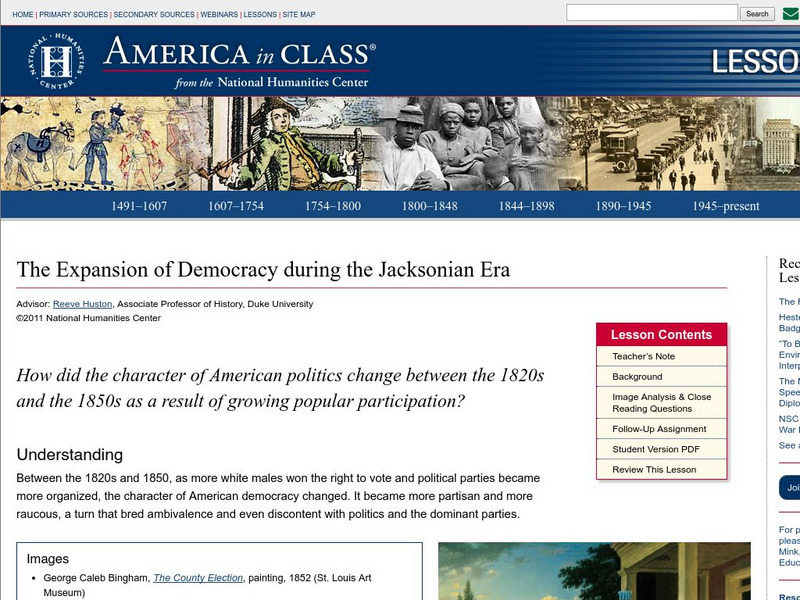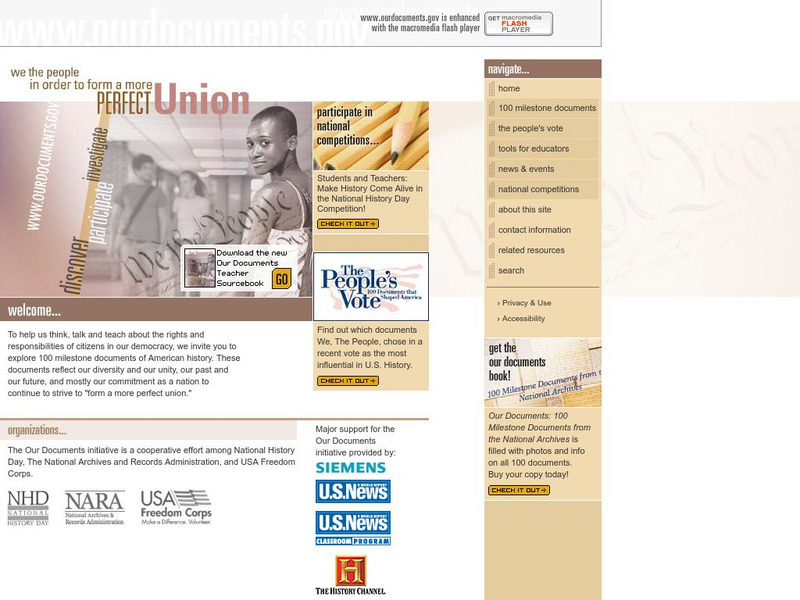Hi, what do you want to do?
Curated OER
How Michigan Law Affects You
Students examine how the laws in Michigan affect their lives. They use primary source documents to analyze the state's history. They discuss laws pertaining to women as well.
Curated OER
Interest Groups in South Carolina Government
Students create an outline and short class presentation about an assigned interest group by conducting research using the Internet and interest group contacts. They evaluate the role of an assigned interest group in the South Carolina...
Curated OER
The Cost of Saving
Tenth graders compare accounts provided by the two newspaper articles with the visual account provided by Sue Coe. They articulate how those accounts are alike and different. Students consider the economic choices that made the Hamlet...
Curated OER
A Share in America
Students examine map - reflect on why English colonist kept coming to America (scarcity of land in England / seemingly endless land in America)
Recite line from English poem. They discuss English attitude towards Indians and their lands.
Curated OER
The Marshall Plan And The Reconstruction Of Europe
Third graders investigate various aspects that are associated with the history of Maryland. They look at the establishment of America as becoming a superpower. They conduct research using the text provided. The students gather the...
Curated OER
he Inauguration and the Media
Students read, review, and write about the presidential inauguration as it appears in the media. They use local local and national newspapers to gain information about the inauguration. Students develop their own editorial on the...
Curated OER
The Life of Dona Felisa Rincon De Gautier
Students identify Puerto Rico and discuss its relationship and proximity to the United States. Next, students identify significant events that occurred during Dona Felisa's term in office and how if may have affected her popularity. ...
Curated OER
Arkansas and the Civil Rights Movement
In this Arkansas reading comprehension worksheet, students read a 2-page selection regarding the state and the Civil Rights Movement and they answer 10 true or false questions pertaining to the selection.
Curated OER
NAFTA Trade Unit
Learners research the geography, economics and government of Canada and how that affects US/Canadian trade relations. In this NAFTA activity, students play a game, read about Canadian history, and creat a graph.
Curated OER
Breaking News English: Laura Bush's 5 Hour Afghan Trip
In this English activity, students read "Laura Bush's 5 Hour Afghan Trip," and then respond to 47 fill in the blank, 7 short answer, 20 matching, and 8 true or false questions about the selection.
Constitutional Rights Foundation
Constitutional Rights Foundation: John Dewey and the Reconstruction of American Democracy
Article and activity on the ideas and philosophy of John Dewey in which students critique Dewey's methods and evaluate the relevancy of his ideas for American democracy today.
Khan Academy
Khan Academy: Unit: Foundations of American Democracy
This unit from Khan Academy provides many lessons and practice sessions over the foundations of American democraccy. This lesson is intended for students taking high school or college level American Government and Civics courses,...
Rock and Roll Hall of Fame
Rock & Roll Hall of Fame: Sti Lesson 45: Democracy Not Yet!
The following instructional activity uses the lyrics of four popular songs (songs that were commonly sung or played) to stimulate critical thought and discussion of what is right or wrong with American democracy.
OpenStax
Open Stax: The Rise of American Democracy
After reading this section of a chapter on "Jacksonian Democracy", students will be able to describe the key points of the election of 1828 and explain the scandals of Andrew Jackson's first term in office.
CommonLit
Common Lit: "The Founding of American Democracy" by Jessica Mc Birney
A learning module that begins with "The Founding of American Democracy" by Jessica McBirney, accompanied by guided reading questions, assessment questions, and discussion questions. The text can be printed as a PDF or assigned online...
National Humanities Center
National Humanities Center: America in Class: Expansion of Democracy During the Jacksonian Era
Lesson where students explore the emergence of the American system of democracy and political parties between 1820 and 1850. Using paintings by George Caleb Bingham and Richard Caton Woodville, and a political cartoon depicting the...
Khan Academy
Khan Academy: Types of Democracy
This resource from Khan Academy provides practice questions over the types of democracy. These questions are intended for students taking high school or college level American Government and Civics courses, including the AP Government...
Khan Academy
Khan Academy: Ideals of Democracy
This resource from Khan Academy provides practice questions over the ideals of democracy. These questions are intended for students taking high school or college level American Government and Civics courses, including the AP Government...
US National Archives
Our Documents: A National Initiative on American History, Civics, and Service
Our Documents is home to one hundred milestone documents that influenced that course of American history and American democracy. Includes full-page scans of each document, transcriptions, background information on their significance, and...
Internet History Sourcebooks Project
Fordham University: Modern History Sourcebook: Alexis De Tocqueville: Democracy in America
Excerpts from Democracy in America, a book by Alexis de Tocqueville published in 1898.
Constitutional Rights Foundation
Constitutional Rights Foundation: Slavery, Civil War, and Democracy: What Did Lincoln Believe?
Activity in which students examine the concept of democracy and the idea of a "just society" through the eyes of Abraham Lincoln. Lesson includes questions for discussion and activity in which students prepare a speech on the what they...
Annenberg Foundation
Annenberg Learner: Democracy in America
A collection of videos focused on American civics. Included with videos are activities, readings and additional resources.
The Newberry Library
Newberry Library: Dissent and Democracy in Modern American History
Learning resource in which students examine primary source material for a look at the forms of dissent in U.S. history and the role dissent plays in a representative democracy. Questions for consideration are included.
PBS
Pbs Learning Media: Primary Source Set: Jacksonian Democracy?
A collection that uses primary sources to explore Jacksonian democracy.
Other popular searches
- Roots of American Democracy
- Basis of American Democracy
- Origins American Democracy
- Early American Democracy
- Native American Democracy
- Analyze American Democracy

























